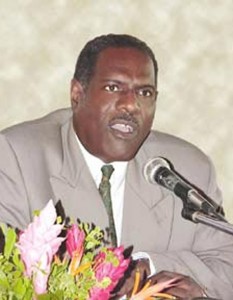By Vaughan A. Lewis,
Former Prime Minister of St Lucia;
Professor Emeritus, Institute of International Relations,
University of the West Indies, St Augustine, Trinidad and Tobago
It is a pleasure to be invited to write a few words on the occasion of Sonny Ramphal’s eightieth birthday, and in so doing, to celebrate the work of one who is, undoubtedly, the Caribbean Community’s most distinguished diplomatist. I cannot claim, like others of his generation, to have deep knowledge of all the intricacies of his life as a legal adviser, diplomatist, political technocrat and politician. But I do belong to a generation which in working with, or in relation to, him has stood sometimes in wonderment at the sheer energy and ability for innovation which he has displayed for much of his multifaceted career.

Sonny Ramphal of course belongs to that first immediate pre-independence era generation of persons who displayed early their strong capabilities in their chosen careers, and were well on the way to distinguishing themselves, but who were drawn into political leadership at various levels as independence dawned. He belongs to a generation strongly influenced by the promise of a collective independence for the anglophone countries of the Caribbean, then disappointed by the failure of Federation, but who have continued to believe that the collective action approach would best fulfil for the people of the Caribbean, the promise of independence.
That belief in collective action he carried into his diplomatic tour de force of engagement with the countries of Africa and the Pacific towards the undoubted success of establishment of the Lomé Conven-tion. In doing this he believed, as he continues to stress today, that such engagement can only enhance possibilities for the strengthening of West Indian independence, and for establishing a continuing basis for the political and diplomatic influence which our countries, as small entities, need to acquire, in order to achieve their objectives in the dynamic global environment.
He carried this perspective into his work in the Commonwealth, stressing then the need for that institution to extend its connections to other global, or partially global institutions – an attitude and approach to his work which was also in evidence in his contributions to the number of international commissions on which he sat through the years. I myself had an opportunity to hear at first hand, his exposition of this perspective when in 1979, he invited the late Lloyd Searwar and myself to participate in designing arrangements for a South-Secretariat that could strengthen the hand of the developing and non-aligned countries in negotiations directed towards the institutional reshaping of the global economic order in particular.
As Director-General of the Organisation of Eastern Caribbean States, I did witness the evolution of a difference of view on the issue of the intervention in Grenada in 1983. But our own leaders, even at that tense time could respect his dexterity, and credit him with creating a reasonable consensus at the Commonwealth Heads Meeting in India, that redounded to their own benefit, as the issue of small states’ vulnerabilities came fully into international purview.
It has heightened one’s respect and admiration for Sonny, to see that even at this time, he has actively engaged with others in seeking to change our approach to relations with the European Union in the so-called EPA debate. I have observed that his central principles of cooperation and diplomatic alliance have pervaded his advice to our Caricom member states at this time. And I have marvelled as he has linked with generations of years after him, as he has tried to convince those in authority of the need for unhurried, but deliberate and forceful diplomacy, deep understanding of the changing trends in world politics and economics, and changing trends in the attitudes of larger traditional powers like those of the European Union to developing and small states, as these larger states become consumed with growing competition between themselves, and growing challenges for the so-called emerging economies.
May he have many more years of that intellectual strength which he has always so willingly placed at the service of our Caribbean countries.





